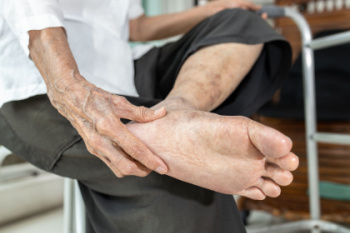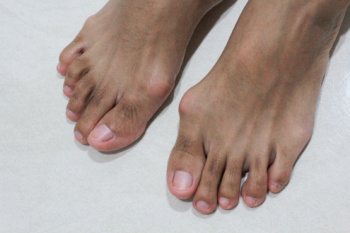
 Tarsal tunnel syndrome, which involves the compression of the posterior tibial nerve as it passes through the tarsal tunnel on the inner side of the ankle, can be tricky to diagnose. Diagnosis typically begins with a physical examination where a podiatrist, or foot doctor, evaluates the foot for signs of nerve compression. The podiatrist may use specific tests that could provoke symptoms. To confirm the diagnosis and eliminate other potential conditions, magnetic resonance Imaging, or an MRI scan is commonly used. An MRI can provide clear images of the soft tissues surrounding the ankle, helping to identify any abnormalities like tumors, varicose veins, or structural deformities compressing the nerve. The treatment strategy may vary depending on MRI findings. For example, if the MRI reveals a structural anomaly compressing the nerve, surgical intervention may be required to alleviate the pressure. However, if inflammation is mild and no significant anatomical issues are detected, more conservative treatments like corticosteroid injections or custom orthotics might be effective. For proper diagnosis of tarsal tunnel syndrome and the most effective treatment plan, it is suggested that you consult a podiatrist.
Tarsal tunnel syndrome, which involves the compression of the posterior tibial nerve as it passes through the tarsal tunnel on the inner side of the ankle, can be tricky to diagnose. Diagnosis typically begins with a physical examination where a podiatrist, or foot doctor, evaluates the foot for signs of nerve compression. The podiatrist may use specific tests that could provoke symptoms. To confirm the diagnosis and eliminate other potential conditions, magnetic resonance Imaging, or an MRI scan is commonly used. An MRI can provide clear images of the soft tissues surrounding the ankle, helping to identify any abnormalities like tumors, varicose veins, or structural deformities compressing the nerve. The treatment strategy may vary depending on MRI findings. For example, if the MRI reveals a structural anomaly compressing the nerve, surgical intervention may be required to alleviate the pressure. However, if inflammation is mild and no significant anatomical issues are detected, more conservative treatments like corticosteroid injections or custom orthotics might be effective. For proper diagnosis of tarsal tunnel syndrome and the most effective treatment plan, it is suggested that you consult a podiatrist.
Tarsal tunnel syndrome can be very uncomfortable to live with. If you are experiencing tarsal tunnel syndrome, contact Dr. Harris L. Klear of Burlington County Podiatry Associates. Our doctor can provide the care you need to keep you pain-free and on your feet.
Tarsal Tunnel Syndrome
Tarsal tunnel syndrome, which can also be called tibial nerve dysfunction, is an uncommon condition of misfiring peripheral nerves in the foot. The tibial nerve is the peripheral nerve in the leg responsible for sensation and movement of the foot and calf muscles. In tarsal tunnel syndrome, the tibial nerve is damaged, causing problems with movement and feeling in the foot of the affected leg.
Common Cause of Tarsal Tunnel Syndrome
The Effects of Tarsal Tunnel Syndrome
A physical exam of the leg can help identify the presence of tarsal tunnel syndrome. Medical tests, such as a nerve biopsy, are also used to diagnose the condition. Patients may receive physical therapy and prescriptive medication. In extreme cases, some may require surgery.
If you have any questions please feel free to contact one of our offices located in Marlton and Delran, NJ . We offer the newest diagnostic and treatment technologies for all your foot and ankle needs.
 Ingrown toenails are among the most common and painful foot issues people face. An ingrown toenail occurs when the edge or corner of the toenail grows into the surrounding skin, causing irritation, redness, swelling, and pain. If left untreated, ingrown toenails can become infected, leading to more severe discomfort and potentially serious complications. Podiatrists, or foot doctors, specialize in treating ingrown toenails and offer effective solutions to alleviate the pain associated with this condition. When you visit a podiatrist for an infected ingrown toenail, they will first assess the severity of the problem. Targeted treatment typically involves gently trimming or removing the ingrown portion of the nail, along with providing relief for any associated infection. Podiatrists can also offer guidance on proper nail care techniques to help prevent future occurrences. If you're dealing with the discomfort of an ingrown toenail, it is suggested that you schedule an appointment with a podiatrist.
Ingrown toenails are among the most common and painful foot issues people face. An ingrown toenail occurs when the edge or corner of the toenail grows into the surrounding skin, causing irritation, redness, swelling, and pain. If left untreated, ingrown toenails can become infected, leading to more severe discomfort and potentially serious complications. Podiatrists, or foot doctors, specialize in treating ingrown toenails and offer effective solutions to alleviate the pain associated with this condition. When you visit a podiatrist for an infected ingrown toenail, they will first assess the severity of the problem. Targeted treatment typically involves gently trimming or removing the ingrown portion of the nail, along with providing relief for any associated infection. Podiatrists can also offer guidance on proper nail care techniques to help prevent future occurrences. If you're dealing with the discomfort of an ingrown toenail, it is suggested that you schedule an appointment with a podiatrist.
Ingrown toenails can become painful if they are not treated properly. For more information about ingrown toenails, contact Dr. Harris L. Klear of Burlington County Podiatry Associates. Our doctor can provide the care you need to keep you pain-free and on your feet.
Ingrown Toenails
Ingrown toenails occur when a toenail grows sideways into the bed of the nail, causing pain, swelling, and possibly infection.
Causes
Prevention
Because ingrown toenails are not something found outside of shoe-wearing cultures, going barefoot as often as possible will decrease the likeliness of developing ingrown toenails. Wearing proper fitting shoes and using proper cutting techniques will also help decrease your risk of developing ingrown toenails.
Treatment
Ingrown toenails are a very treatable foot condition. In minor cases, soaking the affected area in salt or antibacterial soaps will not only help with the ingrown nail itself, but also help prevent any infections from occurring. In more severe cases, surgery is an option. In either case, speaking to your podiatrist about this condition will help you get a better understanding of specific treatment options that are right for you.
If you have any questions please feel free to contact one of our offices located in Marlton and Delran, NJ . We offer the newest diagnostic and treatment technologies for all your foot and ankle needs.

Stress fractures are common injuries to the bones of the legs and feet, resulting from repetitive stress rather than sudden injury. These hairline cracks in the bone affect athletes, including runners, basketball players, or dancers. Pain from stress fractures is particularly felt during weight-bearing activities and direct pressure on the bone. They may be difficult to diagnose as the pain often subsides when activity stops. Because they do not always show up on an X-ray, further diagnostic tests, like CT or MRI scans may be needed. Left untreated, stress fractures in the feet or ankles can worsen, leading to more severe complications. Seeking timely medical attention from a podiatrist is essential for proper diagnosis and treatment tailored to individual needs. This facilitates pain relief, promotes healing, and prevents further damage. If you are experiencing symptoms suggestive of a stress fracture, it is suggested that you schedule an appointment with a podiatrist.
Activities where too much pressure is put on the feet can cause stress fractures. To learn more, contact Dr. Harris L. Klear from Burlington County Podiatry Associates. Our doctor can provide the care you need to keep your pain free and on your feet.
Dealing with Stress Fractures of the Foot and Ankle
Stress fractures occur in the foot and ankle when muscles in these areas weaken from too much or too little use. The feet and ankles then lose support when walking or running from the impact of the ground. Since there is no protection, the bones receive the full impact of each step. Stress on the feet can cause cracks to form in the bones, thus creating stress fractures.
What Are Stress Fractures?
Stress fractures occur frequently in individuals whose daily activities cause great impact on the feet and ankles. Stress factors are most common among:
Symptoms
Pain from the fractures occur in the area of the fractures and can be constant or intermittent. It will often cause sharp or dull pain with swelling and tenderness. Engaging in any kind of activity which involves high impact will aggravate pain.
If you have any questions please feel free to contact one of our offices located in Marlton and Delran, NJ . We offer the newest diagnostic and treatment technologies for all your foot and ankle needs.
 Choosing the right shoes is important for people with arthritic feet. Wearing proper footwear can significantly alleviate pain and improve mobility, while the wrong shoes can worsen symptoms of arthritis. Shoes with a wide toe box, cushioned soles, and adequate arch support can help distribute weight evenly, reduce pressure on sensitive areas, and support the foot's natural shape. Additionally, shoes with adjustable closures, such as Velcro straps or laces, can accommodate changes in foot size due to swelling. Podiatrists play a key role in this selection process by evaluating your specific foot structure, identifying areas of concern, and recommending footwear that addresses your unique needs. Podiatrists may also suggest custom orthotics, which are personalized insoles that fit inside your shoe. If you suffer from arthritic feet, it is suggested that you consult a podiatrist when choosing shoes for maximum support and comfort.
Choosing the right shoes is important for people with arthritic feet. Wearing proper footwear can significantly alleviate pain and improve mobility, while the wrong shoes can worsen symptoms of arthritis. Shoes with a wide toe box, cushioned soles, and adequate arch support can help distribute weight evenly, reduce pressure on sensitive areas, and support the foot's natural shape. Additionally, shoes with adjustable closures, such as Velcro straps or laces, can accommodate changes in foot size due to swelling. Podiatrists play a key role in this selection process by evaluating your specific foot structure, identifying areas of concern, and recommending footwear that addresses your unique needs. Podiatrists may also suggest custom orthotics, which are personalized insoles that fit inside your shoe. If you suffer from arthritic feet, it is suggested that you consult a podiatrist when choosing shoes for maximum support and comfort.
Arthritis can be a difficult condition to live with. If you are seeking treatment, contact Dr. Harris L. Klear from Burlington County Podiatry Associates. Our doctor can provide the care you need to keep you pain-free and on your feet.
Arthritic Foot Care
Arthritis is a term that is commonly used to describe joint pain. The condition itself can occur to anyone of any age, race, or gender, and there are over 100 types of it. Nevertheless, arthritis is more commonly found in women compared to men, and it is also more prevalent in those who are overweight. The causes of arthritis vary depending on which type of arthritis you have. Osteoarthritis for example, is often caused by injury, while rheumatoid arthritis is caused by a misdirected immune system.
Symptoms
Arthritic symptoms range in severity, and they may come and go. Some symptoms stay the same for several years but could potentially get worse with time. Severe cases of arthritis can prevent its sufferers from performing daily activities and make walking difficult.
Risk Factors
If you suspect your arthritis is affecting your feet, it is crucial that you see a podiatrist immediately. Your doctor will be able to address your specific case and help you decide which treatment method is best for you.
If you have any questions, please feel free to contact one of our offices located in Marlton and Delran, NJ . We offer the newest diagnostic and treatment technologies for all your foot care needs.
 Bunions, characterized by a bony bump that forms at the base of the big toe, affect a significant portion of the population. This deformity arises when the big toe begins to lean toward the second toe, causing the structure of the foot to change and result in a bump at the big toe joint. Factors contributing to bunion development include genetic predisposition, footwear choices, and certain foot structures. More women than men have bunions, due to wearing narrow, tight-fitting shoes and high heels that place undue pressure on the forefoot. However, anyone can develop bunions, and they are increasingly observed across all age groups, from teenagers to the elderly. The widespread nature of this condition shows the importance of recognizing early symptoms and seeking appropriate treatment. A podiatrist, or foot doctor, has the specialized knowledge of the foot to properly treat and prevent bunions. It is suggested you schedule an appointment with a podiatrist if you have a bunion to prevent its progression.
Bunions, characterized by a bony bump that forms at the base of the big toe, affect a significant portion of the population. This deformity arises when the big toe begins to lean toward the second toe, causing the structure of the foot to change and result in a bump at the big toe joint. Factors contributing to bunion development include genetic predisposition, footwear choices, and certain foot structures. More women than men have bunions, due to wearing narrow, tight-fitting shoes and high heels that place undue pressure on the forefoot. However, anyone can develop bunions, and they are increasingly observed across all age groups, from teenagers to the elderly. The widespread nature of this condition shows the importance of recognizing early symptoms and seeking appropriate treatment. A podiatrist, or foot doctor, has the specialized knowledge of the foot to properly treat and prevent bunions. It is suggested you schedule an appointment with a podiatrist if you have a bunion to prevent its progression.
If you are suffering from bunion pain, contact Dr. Harris L. Klear of Burlington County Podiatry Associates. Our doctor can provide the care you need to keep you pain-free and on your feet.
What Is a Bunion?
Bunions are painful bony bumps that usually develop on the inside of the foot at the joint of the big toe. As the deformity increases over time, it may become painful to walk and wear shoes. Women are more likely to exacerbate existing bunions since they often wear tight, narrow shoes that shift their toes together. Bunion pain can be relieved by wearing wider shoes with enough room for the toes.
Causes
Symptoms
In order to diagnose your bunion, your podiatrist may ask about your medical history, symptoms, and general health. Your doctor might also order an x-ray to take a closer look at your feet. Nonsurgical treatment options include orthotics, padding, icing, changes in footwear, and medication. If nonsurgical treatments don’t alleviate your bunion pain, surgery may be necessary.
If you have any questions, please feel free to contact one of our offices located in Marlton and Delran, NJ . We offer the newest diagnostic and treatment technologies for all your foot care needs.